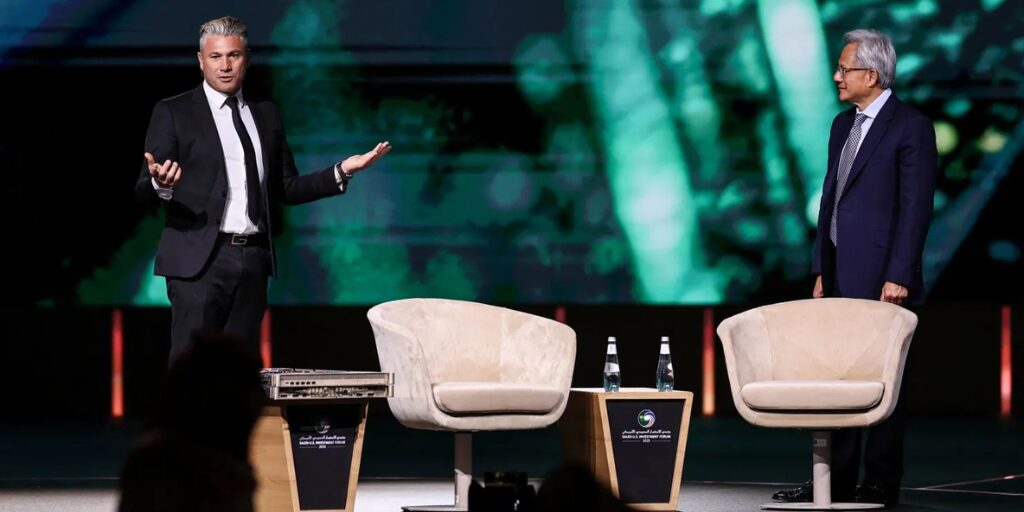Nvidia’s recent shipment of 18,000 AI chips to Saudi Arabia represents a significant step forward in the country’s ambition to become a leader in artificial intelligence. This partnership not only highlights the importance of advanced technology in global relations but also sets the stage for a robust AI infrastructure in the region. As Saudi Arabia invests heavily in digital transformation, the implications of this deal are far-reaching, affecting local industries and workforce development.
Key Takeaways
- Nvidia is supplying 18,000 GB300 Blackwell AI chips to Saudi Arabia’s Humain, marking a key partnership.
- The shipment will support a large 500-megawatt data center, boosting the country’s AI capabilities.
- This collaboration aligns with Saudi Arabia’s Vision 2030, focusing on economic diversification and technological advancement.
- Nvidia’s stock saw a positive reaction, reflecting investor confidence in the company’s growth in AI infrastructure.
- The deal emphasizes the importance of workforce training in AI and robotics for local talent in Saudi Arabia.
Nvidia’s Strategic Partnership With Saudi Arabia
Overview of the Collaboration
The partnership between Nvidia and Saudi Arabia, particularly with Humain (owned by the Saudi Public Investment Fund), marks a significant step in Saudi Arabia’s ambition to become a global AI hub. This collaboration involves Nvidia supplying over 18,000 GB300 Blackwell AI chips to power a massive 500-megawatt data center. It’s all part of the kingdom’s push to establish itself as a leader in artificial intelligence and high-performance cloud infrastructure. This deal also gives Saudi Arabia access to critical U.S. technology, which is pretty important considering how in-demand Nvidia’s GPUs are right now because of generative AI systems.
Significance of the Deal
This deal is a big deal for a few reasons. First, it shows Saudi Arabia is serious about investing in AI. Second, it gives them access to some of the most advanced AI technology out there. Third, it could help them diversify their economy away from oil. Jensen Huang, Nvidia’s CEO, seems pretty excited about it too. He thinks Saudi Arabia can build the AI infrastructure of their nation and help shape the future of this technology. The market seems to agree, with Nvidia’s stock performance jumping over 5% after the announcement. It’s a win-win, really.
Future Prospects for AI in Saudi Arabia
Looking ahead, this partnership could pave the way for Saudi Arabia to become a major player in the AI world. The plan is to build AI factories with a capacity of up to 500 megawatts, powered by hundreds of thousands of Nvidia’s advanced GPUs over the next five years. This could lead to all sorts of new opportunities, from training programs for Saudis to upskilling in AI and robotics. It all aligns with Saudi Arabia’s Vision 2030 goals, which aim to transform the country into a more diversified and technologically advanced economy. The initial phase includes deploying an 18,000 NVIDIA GB300 Grace Blackwell AI supercomputer with NVIDIA InfiniBand networking.
Impact on Saudi AI Infrastructure
Building a 500-Megawatt Data Center
The partnership between HUMAIN and Nvidia is set to establish a massive 500-megawatt data center in Saudi Arabia. This facility will be a cornerstone of the nation’s AI infrastructure. The data center will house the 18,000 Nvidia GB300 Grace Blackwell AI supercomputers, interconnected with Nvidia InfiniBand networking. This infrastructure will provide the computational power needed for training and deploying large-scale AI models.
Enhancing Digital Transformation
This initiative is expected to significantly accelerate digital transformation across various sectors in Saudi Arabia. The availability of advanced AI infrastructure will enable:
- Development of sophisticated AI applications.
- Improved data analytics capabilities.
- Automation of key processes in industries like manufacturing and logistics.
- The use of GPU cloud computing to support innovation.
Supporting Local Industries
The AI factories will provide local industries with the tools and resources needed to compete on a global scale. This includes:
- Access to cutting-edge AI technology.
- Opportunities for collaboration and knowledge sharing.
- Support for the development of new products and services.
- The ability to create AI factories to drive economic growth.
Nvidia’s Advanced Chip Technology
Introduction to GB300 Blackwell Chips
The buzz around Nvidia’s shipment to Saudi Arabia isn’t just about quantity; it’s about the quality of the tech being shipped. At the heart of this deal are the GB300 Blackwell chips, Nvidia’s latest offering in AI processing power. These chips are designed to handle the intense computational demands of modern AI, machine learning, and data analytics. They represent a significant leap forward, promising to accelerate AI development in Saudi Arabia.
Performance and Capabilities
So, what makes these Blackwell chips so special? Well, for starters, they offer unparalleled performance in terms of processing speed and energy efficiency. They’re built to crunch massive datasets and run complex algorithms faster than ever before. Here’s a quick look at some of their key capabilities:
- Enhanced AI Model Training: Significantly reduces the time required to train large AI models.
- Real-Time Inference: Enables faster and more accurate real-time decision-making.
- Scalability: Designed to scale across multiple GPUs, allowing for even greater processing power.
Comparison with Previous Generations
To really understand the impact of the GB300 Blackwell chips, it’s helpful to compare them to previous generations. The improvements are substantial, offering a significant boost in performance and efficiency. The new chips offer a marked improvement over previous generations. The advancements in processing power are expected to greatly enhance productivity in AI development. The table below highlights some key differences:
| Feature | Previous Generation | GB300 Blackwell | Improvement |
|---|---|---|---|
| Processing Speed | X | 3X | 300% |
| Energy Efficiency | Y | 2Y | 200% |
| Memory Bandwidth | Z | 4Z | 400% |
Economic Implications of the Shipment
Market Reaction to the Announcement
So, Nvidia’s shipment of 18,000 chips to Saudi Arabia? It’s making waves, no doubt. The initial buzz was pretty positive. People see it as a big step forward for Saudi Arabia’s AI ambitions, and that kind of thing tends to get investors excited. The market’s reaction was pretty swift, with tech stocks generally seeing a bump. It’s not just about Nvidia; it’s about the whole AI sector getting a vote of confidence. It’s like everyone’s thinking, “Okay, this AI thing is really happening.”
Nvidia’s Stock Performance
Nvidia’s stock? It’s been on a rollercoaster, let’s be real. But this Saudi deal? It gave it a noticeable lift. It’s not just the immediate jump, though. It’s the long-term implications. People are betting that this is just the beginning. If Saudi Arabia becomes a major player in AI, Nvidia is positioned to be right there with them. Of course, there are always risks. The stock market is a fickle beast, and things can change fast. But for now, things are looking pretty good. Shopify’s stock jumped after announcing price hikes, which is a different sector, but it shows how market news can affect stock performance.
Investment Opportunities in AI
Okay, so you’re thinking about investing in AI? Well, this Saudi deal is just one piece of the puzzle. But it highlights a bigger trend: AI is where the money is going. It’s not just about buying Nvidia stock, though. There are tons of other ways to get involved. Think about companies that are building AI infrastructure, developing AI applications, or even just using AI to improve their own businesses. The possibilities are endless. But, like any investment, do your homework. AI is still a relatively new field, and there are plenty of risks involved. But if you’re willing to take the plunge, the potential rewards are huge. The US inflation rate fell to 2.3% in April, which could influence investment strategies in various sectors, including AI.
Jensen Huang’s Vision for AI
Statements on the Partnership
Jensen Huang, Nvidia’s CEO, is super excited about the collaboration with Saudi Arabia. He thinks it’s awesome that they’re building their own AI infrastructure. Huang believes this will allow the nation to really get involved and shape how this game-changing tech evolves. He sees AI as essential infrastructure, just like roads or power grids. Nvidia is all in on helping Saudi Arabia achieve its goals. It’s a big deal for Nvidia too, as the market reacted positively with a stock increase after the announcement.
Long-Term Goals for AI Development
Nvidia’s not just thinking about today; they’re looking way ahead. Huang envisions a future where AI is everywhere, helping with all sorts of things. He talks about “AI factories,” which sounds like something out of a sci-fi movie, but it’s basically about using AI to make other AI, and to boost industries. Nvidia wants to be at the forefront, pushing the boundaries of what AI can do. They’re investing big in research and development to make sure they stay ahead of the curve. It’s all about creating a world where AI solves problems we can’t even imagine yet. By the way, if you are looking for AI tools to use daily, there are many options available.
Nvidia’s Role in Global AI Leadership
Nvidia is positioning itself as a leader in the global AI race. They’re not just selling chips; they’re building entire platforms and ecosystems. The deal with Saudi Arabia shows they’re serious about expanding their reach and influence. Huang wants Nvidia to be the go-to company for anyone who wants to do serious AI work. They’re competing with other tech giants, but they think their focus on specialized hardware and software gives them an edge. It’s a bold vision, but Huang seems determined to make it happen. They are also working on advanced AI models for enterprise and government use.
Workforce Development Initiatives
Training Programs for Saudis
To make the most of this new AI infrastructure, there’s a big push to train Saudi nationals. It’s not just about having the tech; it’s about having people who know how to use it. These aren’t your basic computer classes either. We’re talking about specialized programs designed to get people up to speed on AI, machine learning, and data science. Think intensive courses, workshops, and maybe even some partnerships with universities to create new AI-focused degrees. It’s a pretty serious investment in human capital. For example, the AI Agent sector is booming, and people need to know how to use them.
Upskilling in AI and Robotics
It’s not just about training new people; it’s also about upskilling the current workforce. A lot of jobs are going to change because of AI and robotics, so people need to learn new skills to stay relevant. This means offering training programs to current employees so they can work alongside AI systems and robots. Think about factory workers learning how to program robots or data analysts learning how to use machine learning tools. It’s a big shift, but it’s necessary. The goal is to make sure people aren’t replaced by AI, but instead, work with it.
Aligning with Vision 2030 Goals
All of this workforce development is directly tied to Saudi Arabia’s Vision 2030 plan. Vision 2030 is all about diversifying the economy and moving away from oil. AI is seen as a key part of that plan. By training people in AI and robotics, the country hopes to create new industries and jobs. It’s a long-term strategy, but the idea is that by investing in its people, Saudi Arabia can become a leader in AI. It’s a pretty ambitious goal, but they seem serious about making it happen. Microsoft is laying off 3% of its workforce, so it’s important to have a plan.
Nvidia’s Role in Global AI Trends
Positioning in the AI Market
Nvidia is becoming a major player in the global AI landscape. The company’s partnership with Saudi Arabia to supply over 18,000 GB300 Blackwell AI chips underscores its position. This deal highlights Nvidia’s ability to provide advanced AI models and computing platforms to both enterprise and government sectors. Nvidia’s chips are in high demand, especially for generative AI systems. This deal gives Saudi Arabia access to critical U.S. technology.
Competition with Other Tech Giants
Nvidia isn’t the only company trying to dominate the AI market. There’s a lot of competition from other big tech companies, all trying to develop better AI technology. It’s a race to see who can create the most powerful and efficient AI solutions. Nvidia needs to keep innovating to stay ahead.
Future Innovations in AI Technology
AI technology is changing fast, and Nvidia is working on new innovations. The company is investing in research and development to create even better AI chips and software. These advancements could lead to breakthroughs in areas like robotics, healthcare, and transportation. Nvidia’s future innovations will likely play a big role in shaping the future of AI.
The Future of AI in Saudi Arabia
Vision 2030 and AI Integration
Saudi Arabia’s Vision 2030 plan is really ambitious, and AI is expected to play a big role in making it happen. The government wants to diversify the economy, and AI is seen as a way to create new industries and jobs. It’s not just about tech; it’s about using AI to improve things like healthcare, education, and even how cities are run. The idea is to make Saudi Arabia a hub for innovation, and AI is a key part of that vision. It’s a long-term project, but the initial investments show they’re serious about it.
Potential for AI Factories
There’s been talk about building “AI factories” in Saudi Arabia, and it sounds like something out of a sci-fi movie, but it’s actually happening. These factories would be data centers packed with powerful computers, specifically designed for training AI models. Think of it like a regular factory, but instead of making cars or electronics, they’re producing AI. HUMAIN and NVIDIA are partnering up to make this a reality. The goal is to have the infrastructure to develop AI locally, rather than relying on other countries. It’s a big investment, but it could pay off in the long run by making Saudi Arabia a leader in AI development.
Long-Term Economic Benefits
If Saudi Arabia’s AI plans work out, the economic benefits could be huge. It’s not just about creating a few tech jobs; it’s about transforming the entire economy. AI could make existing industries more efficient, create new business opportunities, and attract foreign investment. Plus, if Saudi Arabia becomes a leader in AI, it could have a big influence on the global tech scene. Of course, there are challenges, like needing skilled workers and dealing with ethical concerns, but the potential rewards are definitely worth pursuing. It’s a long game, but the payoff could be massive.
Challenges and Opportunities Ahead
Supply Chain Considerations
Getting all the necessary components for AI infrastructure isn’t always easy. Global supply chains can be unpredictable, and things like chip shortages or trade restrictions can throw a wrench into even the best-laid plans. For example, if there’s a sudden surge in demand for high-end GPUs from multiple countries, it could create delays and increase costs for Saudi Arabia’s AI projects. China’s push for self-reliance in critical technologies domestic alternatives could also impact the availability of certain components, potentially leading to a more fragmented global technology ecosystem.
Technological Hurdles
Building a cutting-edge AI ecosystem isn’t just about buying the latest hardware. It also requires overcoming some pretty significant technological hurdles. This includes:
- Ensuring seamless integration of different AI systems.
- Developing robust cybersecurity measures to protect sensitive data.
- Keeping up with the rapid pace of innovation in the AI field.
Strategic Partnerships for Growth
To really make the most of its AI ambitions, Saudi Arabia needs to forge strong partnerships with other countries and tech companies. This could involve collaborating on research and development, sharing expertise, and attracting foreign investment. These partnerships can help Saudi Arabia accelerate its AI development and become a major player in the global AI landscape. The recent shipment of Nvidia chips to Saudi Arabia Nvidia sends is a great example of this kind of strategic move.
Looking Ahead: The Future of AI in Saudi Arabia
Nvidia’s shipment of 18,000 AI chips to Saudi Arabia is a big step for the country’s tech ambitions. This deal isn’t just about chips; it’s about building a whole new future. With these advanced tools, Saudi Arabia is setting itself up to be a leader in AI. The new data centers will not only boost local industries but also create jobs and skills for the workforce. As the kingdom pushes forward with its Vision 2030 goals, this partnership with Nvidia could be a game changer. It’s exciting to think about what this means for innovation and growth in the region.
Frequently Asked Questions
What is the significance of Nvidia’s shipment to Saudi Arabia?
Nvidia’s shipment of 18,000 AI chips marks a big step for Saudi Arabia’s technology and AI goals. It shows their commitment to building a strong AI infrastructure.
What type of chips is Nvidia sending to Saudi Arabia?
Nvidia is sending its advanced GB300 Blackwell chips, which are designed for high-performance AI tasks.
How will these chips be used in Saudi Arabia?
The chips will be used to power a large data center that will help train and run AI applications across various industries.
What is the size of the data center being built?
The new data center will have a capacity of 500 megawatts, making it one of the largest in the region.
What economic impact is expected from this partnership?
This partnership is expected to boost local jobs, attract more investments, and improve Saudi Arabia’s position in the global tech market.
How does this deal fit into Saudi Arabia’s Vision 2030?
The deal supports Saudi Arabia’s Vision 2030 by helping to diversify the economy and promote digital transformation.
What training programs will be offered to Saudis?
There will be training programs focused on AI, robotics, and other advanced technologies to prepare the local workforce.
What is Jensen Huang’s view on this partnership?
Jensen Huang, Nvidia’s CEO, is excited about the partnership, seeing it as a way to help Saudi Arabia build its AI future.




